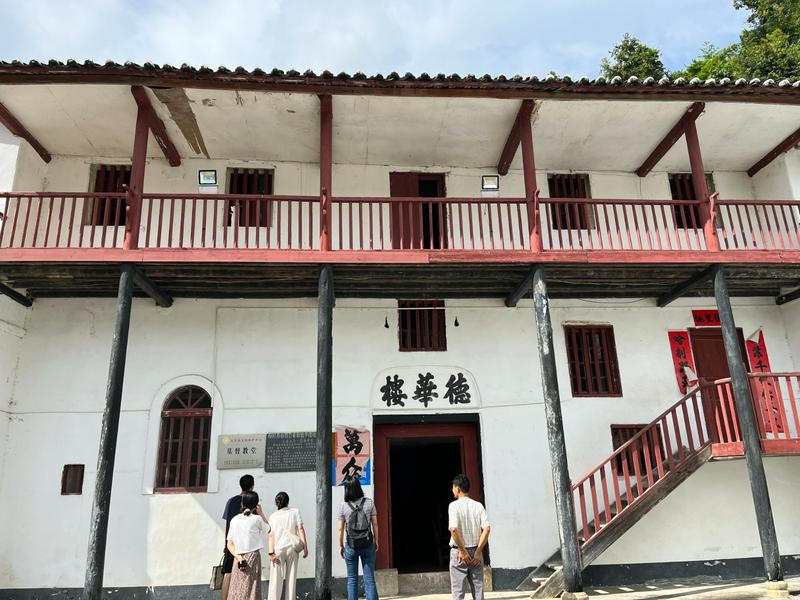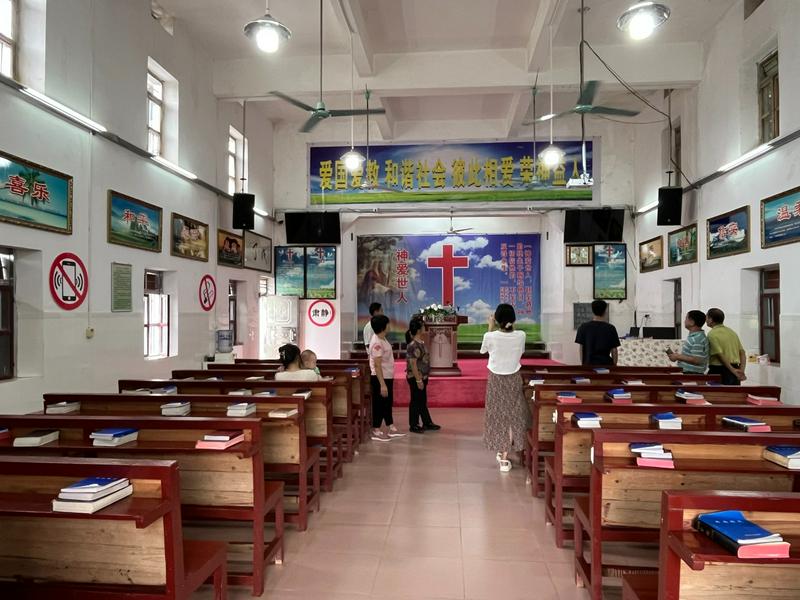"To understand the Hakka church, you must visit Zhangcun (Tschong-tshoun)!" Zhangcun Village in Meizhou, Guangdong, is the birthplace of churches in East Guangdong, bearing historical significance for the Hakka church.
We went to the church in Zhangcun, which was formerly a remote mountain village in Guangdong, in September 2023 with a group of believers.
According to records, every Sunday, believers from neighboring areas would journey to Zhangcun for worship. They would start their journey at dawn, attend services in the afternoon, and return home late, often traveling in the dark.
The "Dehua Building," the original Gospel Church, greeted us when we arrived at our destination. It has been well preserved for nearly 170 years and was listed as a historical and cultural site in Wuhua County in 2010. Currently, it is used as an office building, with the second-floor house being an exhibition room.
According to records, Zhangcun Church was founded in 1855 by Zhang Fuxing (1814–1899), a local figure. Theodore Hamberg performed his baptism in Hong Kong in 1851, and he later went back to preach thereafter raising money to buy a dilapidated house in Zhangcun. The Gospel Church was completed in 1858. After the establishment of Zhangzhou Church, people from nearby counties and cities would come to Zhangcun for Sunday worship.
On the reception room wall of the Dehua Building hangs a map showing the spread of the gospel from Zhangcun in Wuhua to diverse places and the timeline of establishing churches in different locations. By 1949, 168 churches had been established in the Hakka region, with over 16,530 believers.
Apart from church affairs, Zhang Fuxing also founded the only Longheu Girls' School in eastern Guangdong in 1868, nurturing many female pastors. Leyu Middle School was established for believers’ children, teaching courses in the Hakka language (Roman script), children's songs, Hakka language primers, and historical stories in idioms, with a peak enrollment of over 300 students.
As the mother church, from the founding of Zhangcun Church, the Basel Mission gave attention and aid. In 1862, Rev. Philipp Winners from Germany baptized over a hundred believers in Zhangcun. Two years later, German pastors Heinrich Bender and Charles Piton were stationed in Zhangcun. The Gospel Church changed its name to "Dehua Building" in 1864 to represent a building that Germany and China jointly constructed.
From 1864, when Bender arrived in Zhangcun, until around 1907, Western pastors frequently oversaw church affairs, while preaching outside relied on Chinese believers. Zhang often organized evangelistic missions, leading to the establishment of churches in neighboring villages.
In 1914, due to the small size of the original church (the Dehua Building), believers built a new main building to the right of the entrance of the Dehua Building, which was later used as a pastor's residence and baptismal hall.
In 1924, due to changes in the international situation, the Basel Mission reorganized into the Chinese-oriented Tsung Tsin Mission of Hong Kong. Zhangcun Church also entered a period of Chinese self-preaching, self-governing, and self-supporting. Zhang's eldest son, Elder Xinfeng, led the pastoral care of the church. In the winter of 1935, over 900 pastors and believers from Hong Kong, overseas, and distinct churches in Dongmei Liangjiang gathered in Zhangcun for the 80th anniversary celebration of the church.
Zhangcun Elementary School requisitioned the church building after the establishment of the People's Republic of China. During the "Cultural Revolution," the Gospel Church was demolished and turned into a basketball court. After the reform and opening up, the church regained the building, the Dehua Building was reconstructed, and the original Gospel Hall was rebuilt at the remains of the dormitory for Longheu Girls' School.
Exiting the Dehua Building and arriving at the current Gospel Church, it can accommodate around 50 people. Currently, the biggest concern for the church leaders is the absence of pastors; they have to invite nearby pastors to preach on Sundays.
Among the mountains, there is Hecang Village, where the villagers are mostly surnamed Zhang, descendants of Zhang Fuxing.
Farming is the main occupation of the villagers, with primary economic income from grain production, migrant work, and agricultural development. The village focuses on developing ecological economies and is known as a "natural granary." They heavily invest in fruit farming and beekeeping, with many villagers engaged in cultivating high-quality persimmons and beekeeping.
(The above text is compiled from materials inside the Xinfeng Building and references the book The Gospel Pioneer of Hakka Churches: Commemorating the 150th Anniversary of Zhangcun Church.)
- Translated by Abigail Wu













